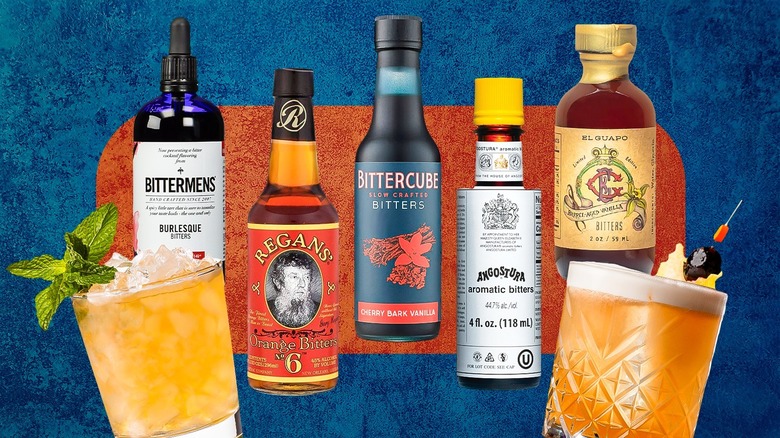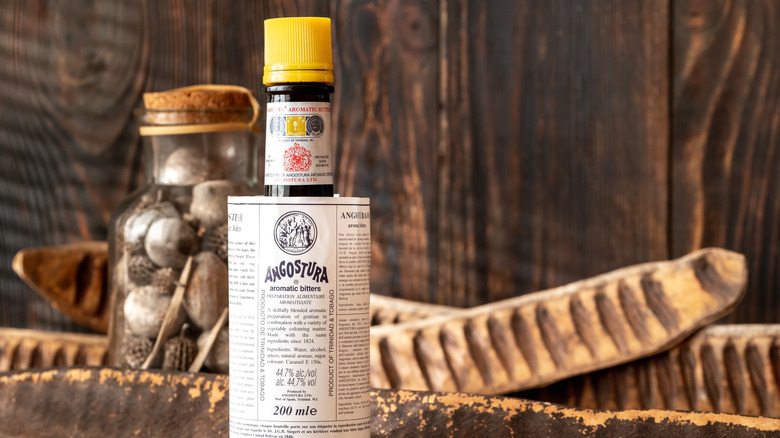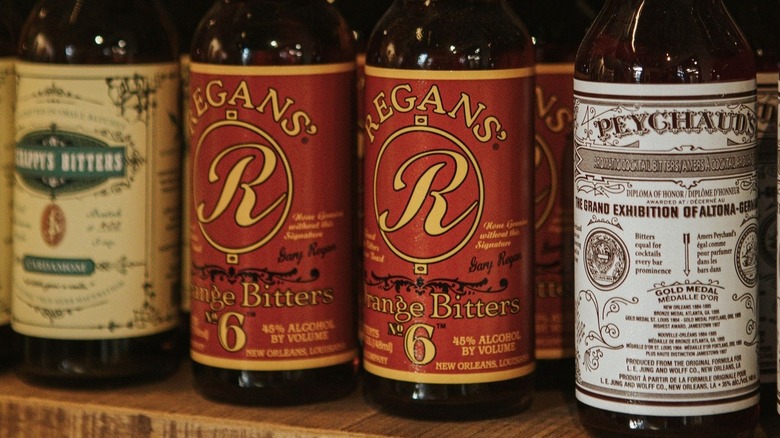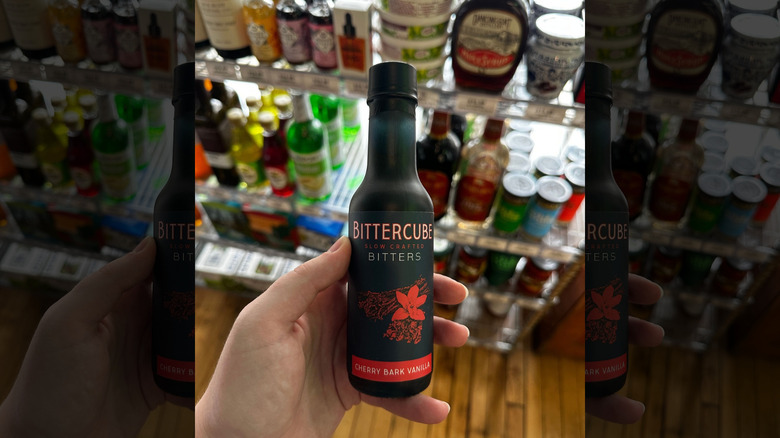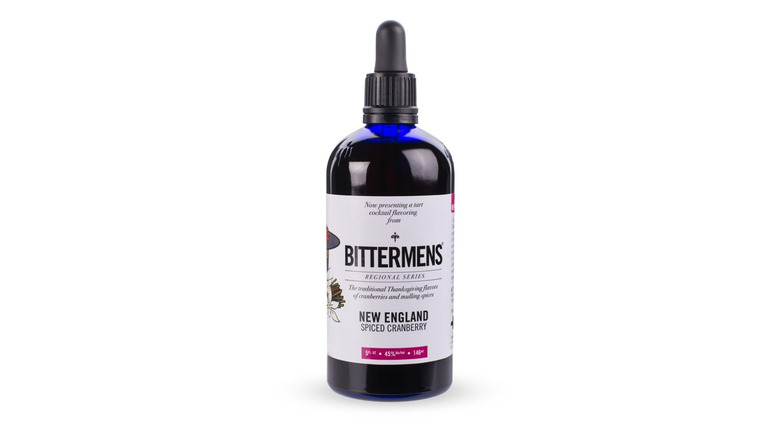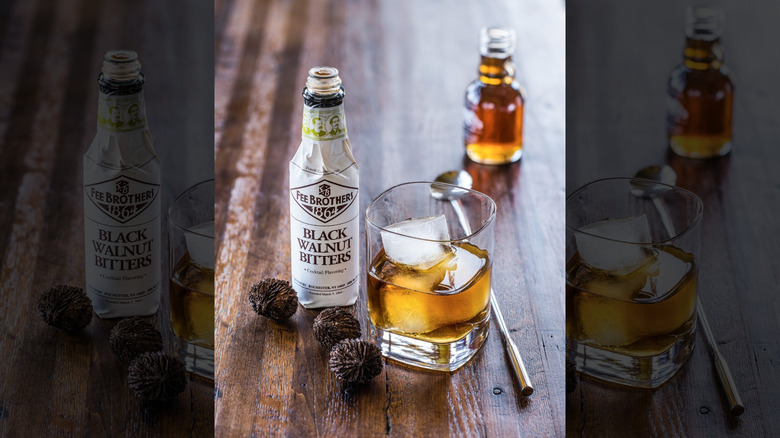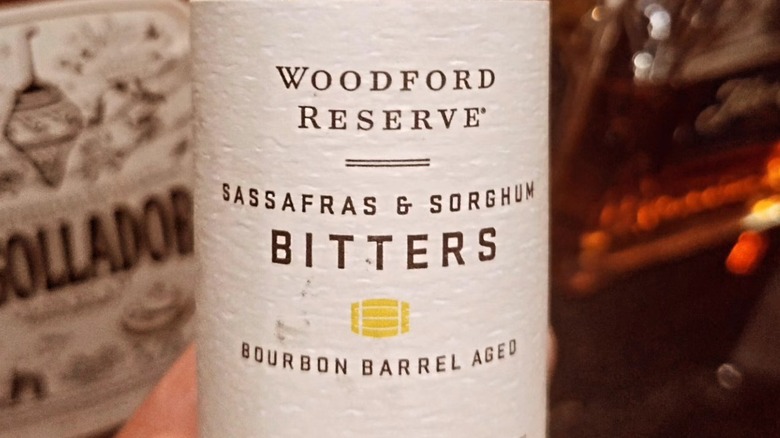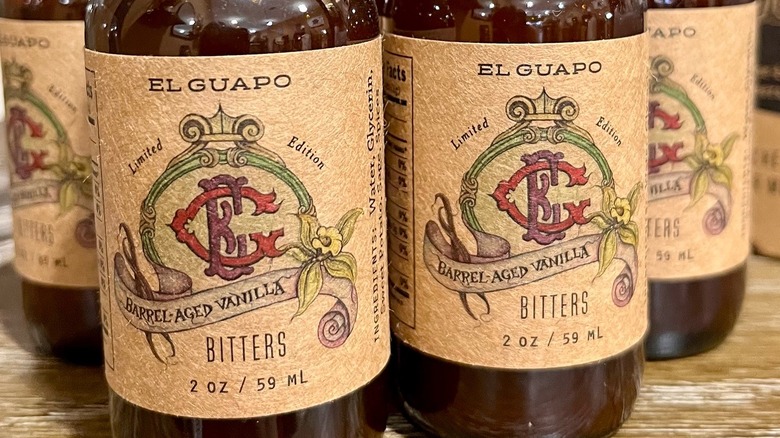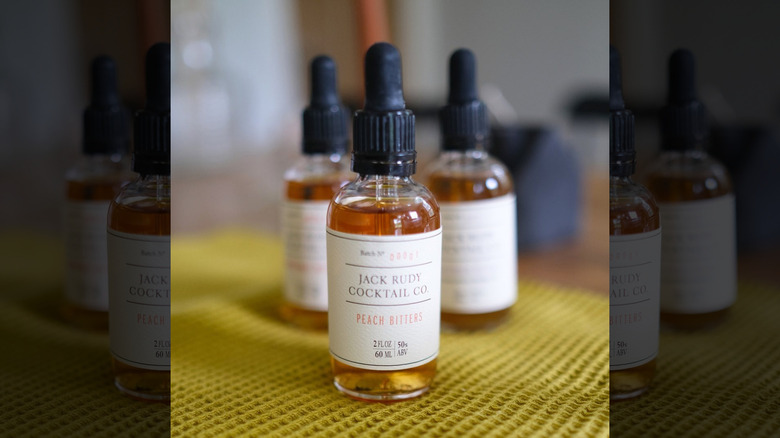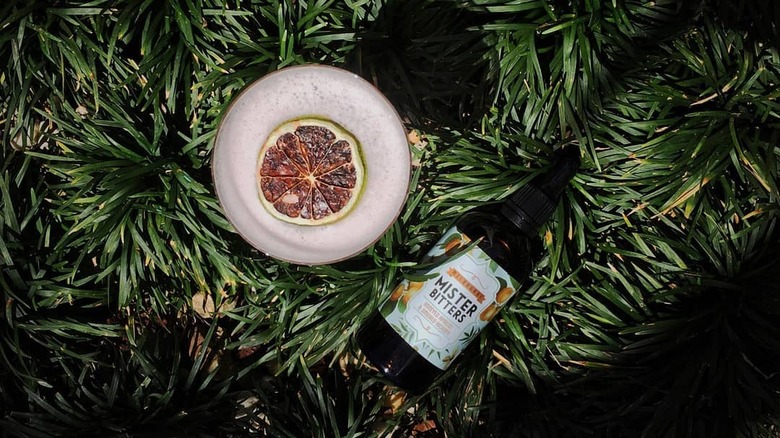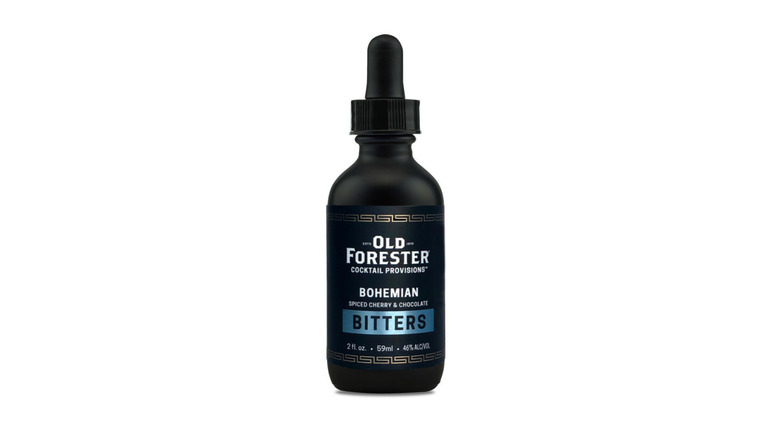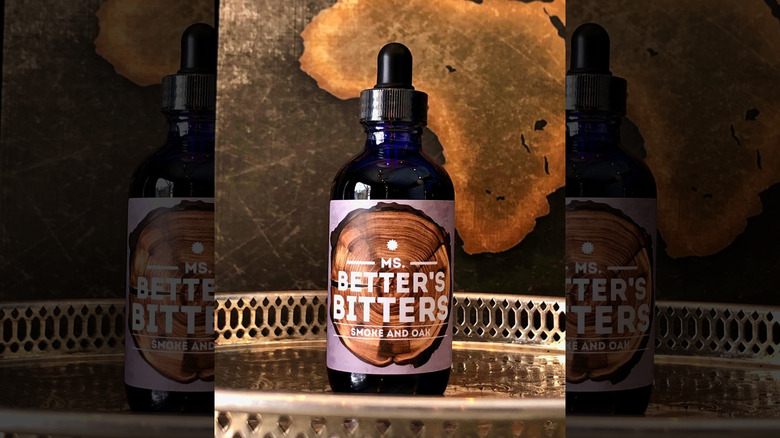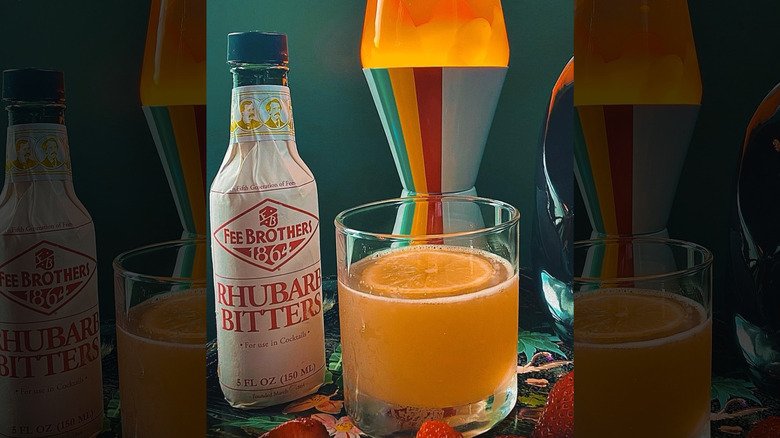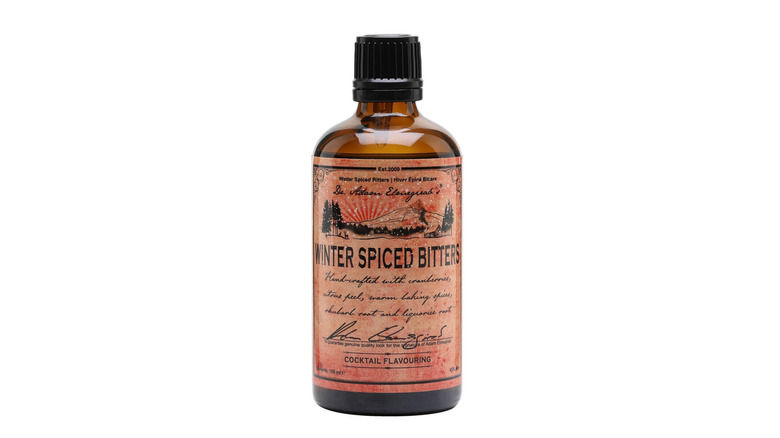14 Best Bitters For Bourbon-Forward Cocktails
We may receive a commission on purchases made from links.
Something you learn very quickly when you become a cocktail bartender is the importance of bitters. On the surface, bitters are a remarkably simple ingredient, consisting of a high-alcohol spirit infused with an array of botanicals. Once, bitters were employed as a medicinal tincture, but they've since become a cocktail bar staple.
Bitters are a critical ingredient in most cocktails, and just a few dashes can transform a mixed drink from good to great or great to outstanding. One of the first things I learned in my cocktail bartending career was the idea that we can typically split bitters into two categories — lifting bitters and binding bitters. Lifting bitters usually feature one or two bold ingredients that elevate a cocktail's flavor profile and introduce new elements. Binding bitters tend to be more complex — while no distinct flavor shines, they marry the different aspects of a drink, creating a cocktail that's more than the sum of its parts.
While I adore most spirits, nothing beats bourbon in my book. It's usually the first base spirit I play with when I'm creating a cocktail menu, so I'm intimately familiar with the best classic and contemporary bourbon cocktails. One thing I love about bourbon is its versatility. The whiskey's robust caramel and vanilla notes can be complemented by all manner of flavors, making bourbon cocktails the perfect host for bitters. Over the years, I've had the opportunity to test a vast range of different bitters. Below, I've listed my favorites for bourbon-forward cocktails.
Angostura
A while back, I wrote up a ranked list of the best cocktail bitters brands. While it may not have been the most original choice, I couldn't help but award Angostura bitters the top spot. It's a name synonymous with cocktail bitters, and if a bar only has one bottle, it's going to be Ango.
Earthy and complex, Angostura bitters boast a delectable bouquet of warm herbs and spices. It's bitter but has rounded notes of dried citrus, tamarind, and cherries that help it create balance within a cocktail while adding welcome depth. Angostura's rich flavor is the perfect match for bourbon, contrasting and highlighting the whiskey's prominent caramel, vanilla, and oak notes and balancing the spirit's sweet profile. There's a reason the old fashioned — arguably the most beloved bourbon cocktail of all time — calls for a few dashes of Ango. Trust me, if you ever need proof that bitters make the difference, try making that cocktail without them, and you'll truly understand their power. Angostura bitters are also a great choice thanks to versatility. While they're excellent for enhancing bourbon-dominant cocktails, they're equally as effective at binding any additional ingredients, too.
Regan's Orange No. 6
For anyone planning on extending their fledgling bitters collection out past Angostura, I always suggest picking up some orange bitters. Like Angostura, they're supremely versatile, and they can be used to both lift and bind a cocktail's ingredients.
If I'm honest, it doesn't really matter what kind of spirit you're using — Regan's Orange No.6 is always going to be the bottle I recommend. However, you could probably argue that they're extra effective with bourbon, and I always add a dash to my old fashioneds. Regan's bitters boast a bright orange-peel zestiness that works wonders to lift bourbon's barrel characteristics. However, they're also enriched with spicy notes of coriander and cardamom that work to marry a cocktail's flavors together. You can easily combine them with other bitters, too, creating a delicious medley of flavors. Regan's bitters are also extraordinarily bitter — that might sound obvious, but there's a spectrum — which makes them ideal for balancing the sweetness of the bourbon. They'll upgrade a Gold Rush just as easily as they will a whiskey sour. If you're a bourbon-lover, you'll find no shortage of uses for Regan's.
Bittercube Cherry Bark Vanilla
Now we've got the more well-known bitters out of the way; it's time to start diving a little deeper. I first encountered Bittercube when I was testing out some rum recipes and decided to give its Blackstrap bitters a try. Impressed with the results, I took a closer look at its range, and the Cherry Bark Vanilla bitters grabbed my attention.
When I started adding dashes to my bourbon cocktails, they did everything I could have hoped for and more. The creamy vanilla notes lift the bourbon's dominant flavor while rounding the spirit, making it taste smoother on the palate. The decadent dark cherry and touches of wood spice also give the whiskey more depth. In fact, I'd even suggest they give harsher, less flavorsome bourbons a more distinguished and mature character. Despite the bitters' more dominant notes, a well-structured botanical base helps meld ingredients together. Even the bitterness itself is notable, featuring an essence of almonds and cacao nibs that beautifully contrast with the caramel and toffee sweetness of bourbon. I suggest trying them out in a bourbon Manhattan, as they're fantastic with the sweet vermouth and soften the cocktail's tannic quality.
Bittermen's New England Spiced Cranberry
Bittermens is another brand that came onto my radar quite early in my career and never left. Some of its tinctures are real workhorses and can be used in all kinds of cocktails, and while Bittermens New England Spiced Cranberry bitters won't work in every drink, they're well worth trying in bourbon-based tipples.
There are plenty of refreshing bourbon cocktails out there, like mint juleps and whiskey smashes, but I find the spirit is most at home in autumnal and wintery drinks. Cocktails that lean into the depth of the whiskey. There are plenty of seasonally-inspired bitters that miss the mark, but these New England Spiced Cranberry bitters prove their value. They're bursting with tart cranberry and zesty lime peel. It's enough to add a pleasant tartness to a drink but these bitters are lower down on the bitterness scale. Additionally, the fruity notes are accompanied by heaps of warming baking spice notes, like clove, cinnamon, and nutmeg. These flavors align superbly with bourbon's taste profile, with the spice highlighting the whiskey's oak notes. I love these in a New York Sour as they're a great match for the red wine component, but if I'm feeling lazy, I'll add a few dashes to a tasty bourbon cranberry.
Fee Brothers Black Walnut
Although I don't love every product in Fee Brothers' bitters range, there are some that are truly world-class — they feature more than once in this article for a reason. At the risk of sounding hyperbolic, I'd argue that Fee Brothers Black Walnut bitters are one of those cocktail ingredients that you didn't know you were missing until you found them.
I first encountered them at my buddy's cocktail bar in New Zealand, in a "Game of Thrones"-inspired cocktail called the Blackwater Bay. This was a delicious, smoke-infused concoction that deftly combined Irish whiskey and Pedro Ximénez sherry, and my friend swore by the magic of his Black Walnut bitters. Intrigued, I ordered a bottle at work and immediately threw some into an old fashioned. The bitters' nutty walnut flavor had a wonderfully complex earthiness and a subtle spice that perfectly accentuated the oakiness of the bourbon. Deeply savory, the bitters also balance out the sweetness of the bourbon and add a nutty character that you typically only find with very well-aged whiskey.
The Bitter Truth Old Time Aromatic
There are few bitters as effective as Angostura when it comes to binding ingredients together. Plenty have tried to outdo Ango and some have even come close, but these are the only bitters that I might argue have pulled it off — at least in bourbon drinks.
The Bitter Truth's Old Time Aromatic bitters are inspired by old-timey bitters recipes, many of which have been lost to the annals of time and recreated by modern entrepreneurs. They're incredibly complex and feature a wide range of spicy and herbaceous flavor notes, like cinnamon, clove, cardamom, and anise. The dominant tasting note is easily gingerbread, although it features in a way that's never overpowering and melds gently into bourbon-forward cocktails. The bittersweet combo manages to lift bourbon's caramel notes while delicately balancing its more saccharine elements. I often swap out Angostura for Old Time Aromatic bitters when bourbon is the base spirit, as they just seem to have a better connection to the whiskey. They're especially effective in a Boulevardier. The original recipe for the bourbon-based twist on a negroni doesn't call for bitters but I believe it would if these were around at the time.
Woodford Reserve Sassafras and Sorghum
Those who are somewhat acquainted with the world of bourbon will recognize the name Woodford Reserve. The famous bourbon brand isn't as historic as some, but it's garnered much acclaim and recognition for its outstanding whiskey. Woodford isn't the only brand to come out with its own range of bitters but it's one of the few that have created bitters I'd choose to stock in my bar.
While I do have a soft spot for its Spiced Cherry bitters, Woodford Reserve's Sassafras and Sorghum bitters are the ones I find myself running through the quickest. For the uninitiated, sassafras is a type of tree, the roots of which were once used to give root beer its distinct flavor. Sorghum is an ancient grain that was once used commonly as a sweetener, especially in bourbon's home of Kentucky. The earthy and slightly medicinal spice of the sassafras and the rich, molasses-like sweetness of the sorghum produce bitters that are perfect for bourbon drinks. The former has a botanical edge that pairs well with the whiskey's oakiness, while the sorghum puts the spotlight on its caramel notes. Best of all, Woodford's bitters are aged in bourbon barrels, giving them an inherent bourbon-iness that most other bitters can't match.
El Guapo Barrel-Aged Vanilla
Let's face it; vanilla gets a bad name. For a flavor that's constantly used as a synonym for "bland" or "boring," it's pretty damn tasty. Besides, if vanilla disappeared overnight, you might not miss it in the ice cream cabinet but you'd definitely notice the loss in bourbon.
So, as a vanilla advocate, I had to try El Guapo's Barrel-Aged Vanilla bitters when I first learned of their existence. I was hoping for lashings of rich and creamy vanilla with a slightly woodsy, smoky profile, and I wasn't disappointed. When used in a bourbon-forward cocktail, these bitters do a stellar job of amplifying the whiskey's own sweet vanilla and caramel notes. The oakiness also adds a wonderful complexity that elevates younger bourbons and emboldens well-aged ones. These bitters are an excellent choice for a dessert cocktail, especially those with a slightly tart fruitiness to further counter the vanilla's sweetness. My go-to bourbon cocktail pairing would be a split-base Chambord and bourbon sour. The whiskey and bitters reduce the raspberry liqueur's sweetness to a more pleasant level, so the cocktail tastes just like boozy raspberry ripple ice cream.
Jack Rudy Peach
Purveyors of small-batch cocktail bitters, premix syrups, and bar tools, Jack Rudy Cocktail Co., has deservedly made a bit of a name for itself in mixology circles. Although its bitters range is relatively traditional in terms of the flavors available, I find its products are reliable and great value for money.
However, in terms of suitability for bourbon-based cocktails, Jack Rudy's Peach bitters truly stand out in my book. Before I discovered these, I used to rely on Fee Brothers for my peach bitters. They're by no means a bad option, but they're a little too candy-like for spirit-forward drinks. These, on the other hand, do a superb job of distilling the essence of juicy, spiced peaches into a tincture. The fruit perfectly highlights bourbon's stone fruit elements, and these bitters help raise the profile of those notes in lighter expressions. They also have a slightly citrusy aspect, which brightens bourbon cocktails — which are typically quite deep and rich — and contrasts nicely with the whiskey's sweeter side. I definitely recommend adding a few dashes to an old fashioned alongside Angostura bitters, but you should also throw a few drops in a classic mint julep to add some fruity depth to the refreshing, summery beverage.
Mister Bitters Honeyed Apricot & Smoked Hickory
Despite the company hailing from Australia, I have to admit that I missed out on its bitters when I was working in bars Down Under. Fortunately, I discovered them at a later date, even if I wish I'd heard of them sooner.
Although Mister Bitters tinctures are a little pricey compared to other brands, that's to be expected when a company commits to hand-crafting its bitters with local ingredients. While I recommend giving the whole range a shot, it's Mister Bitters Honeyed Apricot & Smoked Hickory bitters that truly make bourbon drinks sing. The semi-sweet notes of rich dried apricots are aromatically spicy and slightly floral, and they lean right into bourbon's fruit and honey notes. This alone would be a great addition to a cocktail, but the bitters double down with a pleasantly balanced aroma of earthy, smoked hickory. This boosts the charred oak character of the whiskey without overwhelming a cocktail's more delicate flavors, which is no mean feat. These bitters are another ideal addition for an old fashioned but I love how they can add depth to light and rich cocktails alike. Try them out in a zippy and refreshing Kentucky Mule — a bourbon-based twist on the Moscow Mule — to see exactly what I'm talking about.
Old Forester Bohemian
I'll admit that when I first found out about Old Forester's bitters, I felt the same measure of skepticism as when Woodford Reserve launched its range. I can't help feeling a little cynical when distillers dip their toes into cocktail products, even when they make bourbon as delicious as Old Forester does.
Yet, once again, I was pleasantly surprised. By using bourbon as the base for the bitters — as opposed to the usual neutral spirit — Old Forester's tinctures are remarkably well-suited for whiskey. However, this alone isn't enough to make them stand out. Luckily, Old Forester sticks the landing, especially with its Bohemian Bitters. They feature a real cornucopia of flavors, including sour cherry, herbaceous gentian root and anise, smokey black peppercorns, and earthy cacao nibs. These are superb binding bitters for a bourbon cocktail, essentially doing what Angostura does but laser-focused on the whiskey's unique flavor profile. Bohemian Bitters are impressively robust, too, so you can use them effectively in cocktails like the Paper Plane — a drink that consists of notably pungent and powerful ingredients.
Ms. Better's Smoke and Oak
Although it's not to everyone's taste, I adore smoke as a flavor. However, adding the essence of smoke to cocktails can be a delicate balancing act. For years, my go-to approach was to simply mist or rinse a cocktail with a peaty scotch. It's still a perfectly effective trick, but finding Ms. Better's Smoke and Oak bitters showed me it wasn't the only method that's less time-consuming and intense than using a smoke gun.
I've been let down by smoke-flavored bitters before, but these manage to get the balance just right. The smoke and oak character is bold but not overwhelming, and there are nuanced flavors that raise these bitters above alternatives that only offer the charred wood aspect. There's a touch of sweetness that tempers the smokiness, hints of buttery leather, and some toasted cedar in there as well. These elements make Ms. Better's Smoke and Oak bitters ideal for enhancing the smokey and woody notes in bourbon. Plus, they're smooth enough to use in lighter, more floral cocktails as well as more robust whiskey drinks.
Fee Brothers Rhubarb
To be completely honest, these aren't my all-time favorite rhubarb bitters, but I have a soft spot for them when it comes to bourbon-forward cocktails. There are alternatives that have a more authentic flavor, but Fee Brothers Rhubarb bitters have a distinct character that's superb for dessert-inspired bourbon drinks.
The tart and spicy rhubarb flavor is definitely distinguishable, but it's complemented with a citrus element that helps balance sweeter ingredients. They also have what I can only describe as a sherbert-like profile — sweet, sour, and ever-so-slightly fizzy. As a result, Fee Brothers Rhubarb bitters are great for evening out the flavors in heavier bourbon cocktails, but they'll also give your drink a right and refreshing lift. They're my number one choice for a creamy amaretto sour — I've always found the classic amaretto sour recipe a tad too cloying for my tastes, and I like to use a 2:1 ration of amaretto to bourbon for my spirit base. The whiskey is sweet enough to complement the cherry and almond notes of the liqueur but dry enough to keep the saccharine elements in check. A few dashes of these bitters are all you need to tie the flavors together.
Dr. Adam's Winter Spiced
Dr. Adam's claim to fame lies in its impressive recreation of 18th-century bitters whose recipes have been lost to the annals of time; however, its contemporary tinctures are equally worthy of praise. In particular, Dr. Adam's Winter Spiced bitters are an excellent choice for bourbon-forward, seasonal cocktails.
I've found many winter-inspired bitters to fall short of their goal. They often come across as a bit gimmicky, featuring a vaguely Christmassy profile of amalgamated baking spices and dried fruit without any nuanced complexity. This is where Dr. Adam's gets it right. The expected flavor notes are all there — warming cinnamon, nutmeg, clove, anise, and rich dried fruit — but there's also a slight herbaceousness that allows the bitters to bind with a wider range of ingredients. There are also touches of wood smoke that make them an even more effective partner for bourbon's oaky profile. When the temperature drops, I can't help whipping up batches of hot buttered whiskey, swapping the typical rum base for a well-aged bourbon. I thought I'd perfected my recipe until I discovered these bitters, which became the cherry on top of the rich and warming winter tipple.
